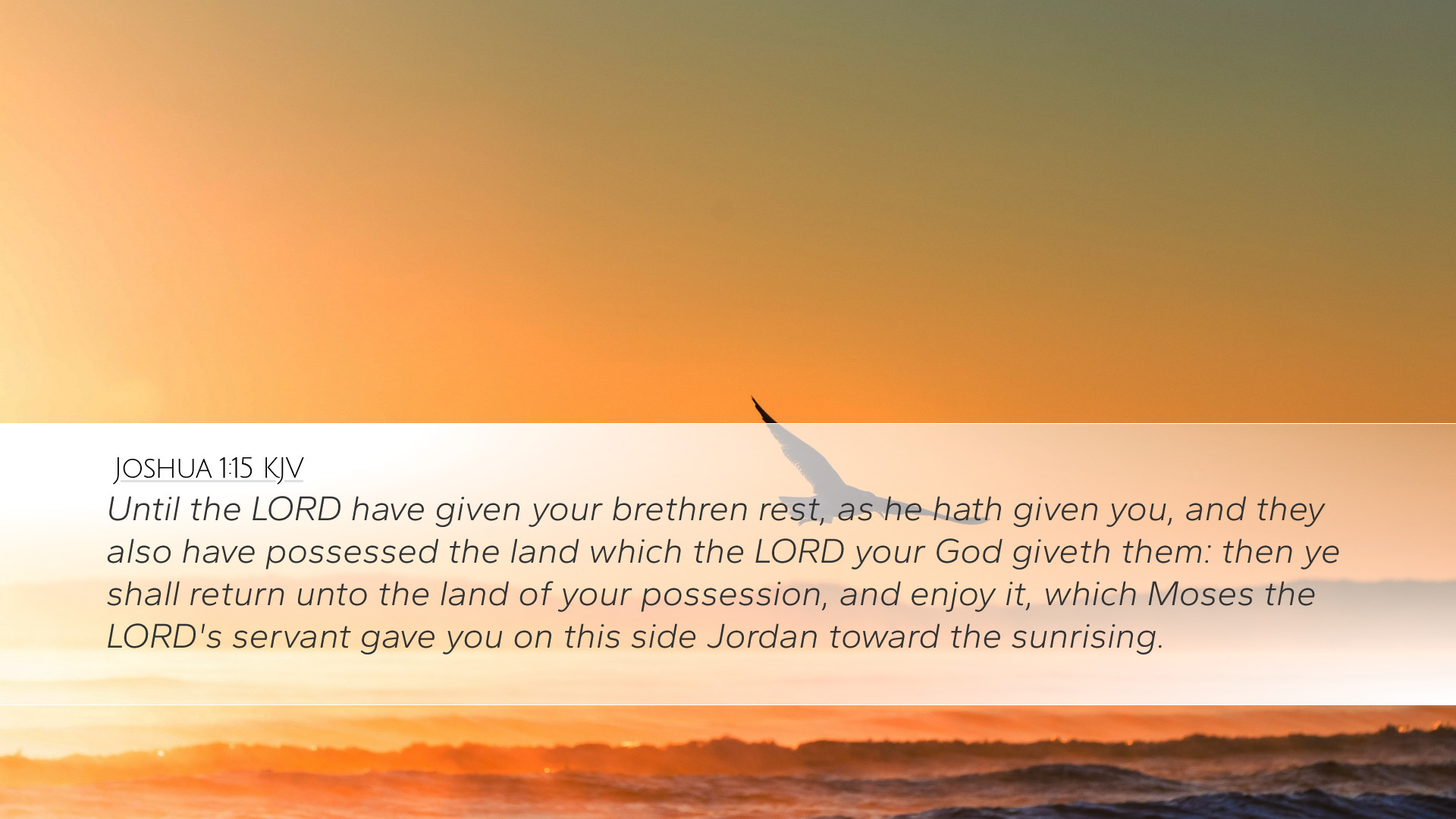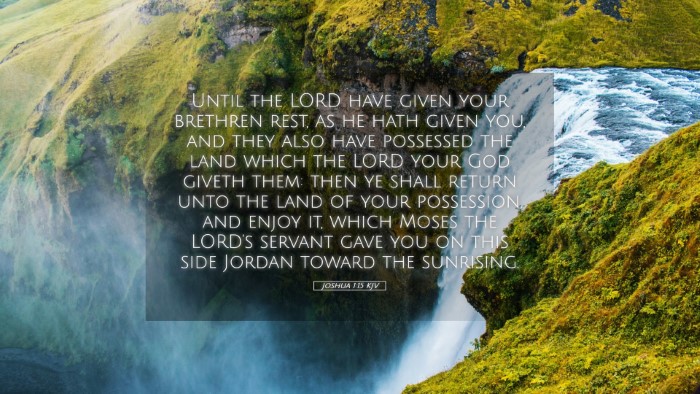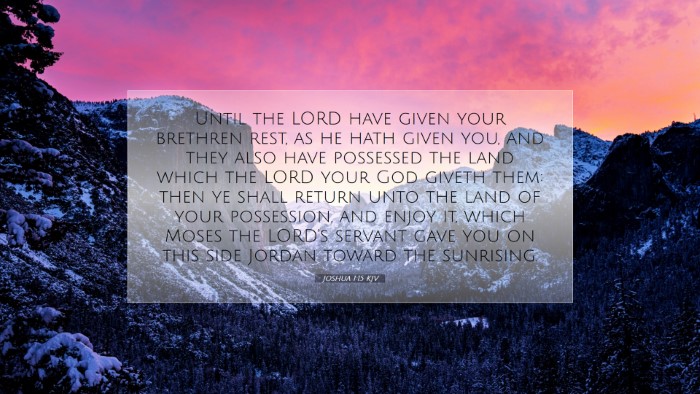Old Testament
Genesis Exodus Leviticus Numbers Deuteronomy Joshua Judges Ruth 1 Samuel 2 Samuel 1 Kings 2 Kings 1 Chronicles 2 Chronicles Ezra Nehemiah Esther Job Psalms Proverbs Ecclesiastes Song of Solomon Isaiah Jeremiah Lamentations Ezekiel Daniel Hosea Joel Amos Obadiah Jonah Micah Nahum Habakkuk Zephaniah Haggai Zechariah MalachiJoshua 1:15
Joshua 1:15 KJV
Until the LORD have given your brethren rest, as he hath given you, and they also have possessed the land which the LORD your God giveth them: then ye shall return unto the land of your possession, and enjoy it, which Moses the LORD's servant gave you on this side Jordan toward the sunrising.
Joshua 1:15 Bible Commentary
Commentary on Joshua 1:15
Introduction
Joshua 1:15 is a significant verse in the context of Israel's journey into the Promised Land. This verse demonstrates not only the transitional phase of leadership from Moses to Joshua but also the imperative for Israel to commit fully to God's command as they prepare to conquer Canaan.
Text of Joshua 1:15
"Until the LORD has given your brethren rest, as He gave you; and they also have taken possession of the land which the LORD your God is giving them." (Joshua 1:15, NKJV)
Contextual Analysis
Matthew Henry emphasizes the importance of context in understanding this verse. Israel's initial entry into Canaan required unity, obedience, and collective effort. The tribes of Reuben, Gad, and the half-tribe of Manasseh made a request to settle on the east side of the Jordan, which necessitated a strong commitment to assist their brethren in battle before enjoying their rest.
Albert Barnes notes that this command serves as both a reminder and a motivation. The Israelites must recognize their duty not only to their own kin but also to the greater purpose of God’s plan. The rest that God promised is contingent on the fulfillment of collective responsibilities.
Adam Clarke elucidates the theological implications, suggesting that this verse is not merely a historical directive but serves as a metaphor for our spiritual journey. Just as the Israelites were to assist one another, so should modern believers support one another in faith and service to God.
Key Themes
- Unity in Mission
This verse encapsulates the vital theme of unity. The tribes that settled on the east of Jordan were reminded of their responsibilities towards their fellow Israelites. Their duty was not complete until they aided their brothers in the military conquest of the Promised Land.
- Collective Responsibility
Barnes highlights that the unity demonstrated here encapsulates the spirit of collective responsibility. Each individual's actions affect the entire community, emphasizing that spiritual rest and blessing are tied to the fulfillment of shared duties.
- Rest as a Divine Promise
The promise of rest is significant in this context. Henry indicates that rest symbolizes not merely a physical cessation of labor but a spiritual fulfillment in God's promises. Rest is linked to obedience; only through collective action and fulfilling God's mandates can true rest be achieved.
- Leadership Transition
This passage occurs in the transitional phase of leadership from Moses to Joshua. Clarke highlights this shift, indicating the need for Joshua to rally the people around a common cause while maintaining their obligations to God and each other.
Theological Implications
In broader theological discourse, this passage is illustrative of the interconnectedness of the body of Christ. Matthew Henry's reflections suggest that believers are called to support each other as they embark on spiritual journeys. The notion of aiding one another, as seen in the actions of the Israelite tribes, echoes the New Testament principle of love and support within the church.
Moreover, this verse instills a sense of anticipation for the rest that God provides—a theme prevalent throughout Scripture. The Apostle Paul reiterates this concept in his letters, stressing the importance of perseverance in faith as followers await their spiritual rest (Hebrews 4:1-11).
Practical Applications
- Encouragement in Community
Much like the Israelites supported one another, modern believers are encouraged to foster communal bonds that reflect the support and love expected in Christ's teachings. Pastors can cultivate environments where congregants feel obliged and empowered to help each other.
- Responsibility Among Believers
This passage calls for self-reflection on how individual pursuits may impact the community. Each member of the church-body shares a weighty role in advancing God's kingdom and ensuring collective well-being.
- Spiritual Leadership
For those in leadership, the call for commitment and support in Joshua 1:15 is poignant. Clarke's commentary suggests that effective leaders must guide their communities with a heart for mutual interdependence and unconditional support.
- Embracing God’s Promises
Lastly, the promise of rest should serve as a beacon of hope for believers. As they navigate trials, they should remain steadfast in their commitments, aware of the ultimate rest that awaits. Pastors and theologians can draw from this as they offer words of hope to congregations facing challenges.
Conclusion
Joshua 1:15 holds profound significance for understanding the nature of community, divine promise, and the expectation of active participation in God’s plans. It calls believers to unite in their responsibilities while keeping sight of God’s promises. In a modern context, it serves as a powerful reminder that our individual walks are intertwined, and our faith journeys depend on the cooperation and encouragement of one another.


